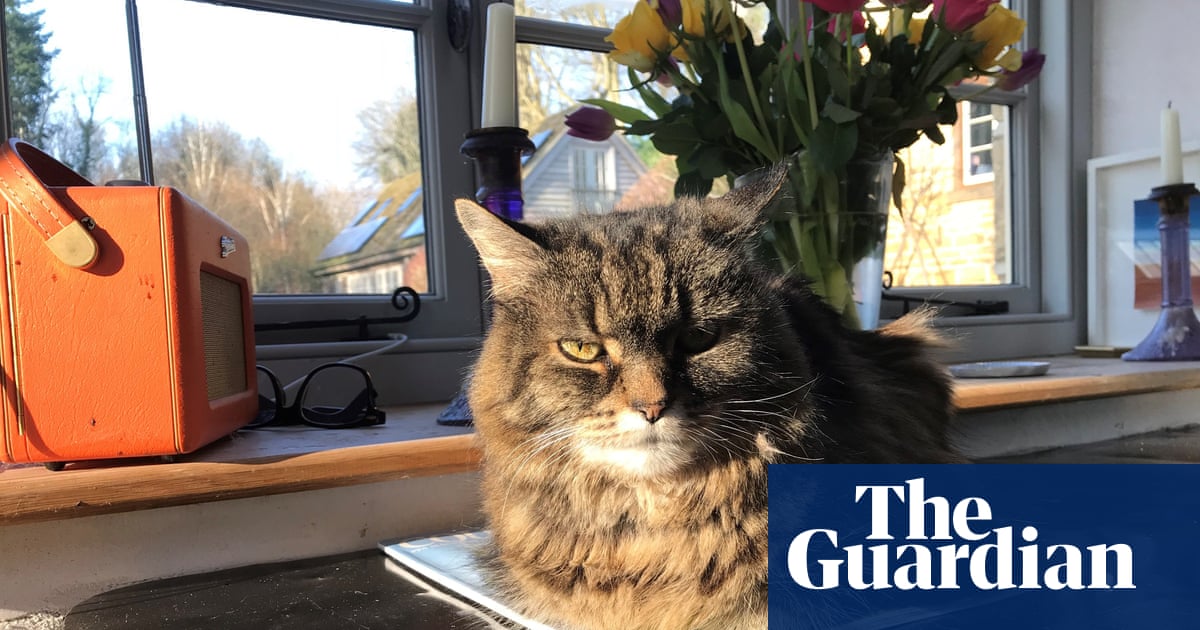
Griffin Dunne has just written a book. He had been meaning to do so for ages. It was one of the items on his bucket list: learn a musical instrument, master Spanish and write his damn memoir. “One down, two to go,” he says, beaming in via video link from his home in upstate New York. The actor and film-maker turns 69 this weekend. He reckons that still leaves him time for the music and Spanish.
Dunne imagined his memoir as a family portrait in the style of David Sedaris’s Me Talk Pretty One Day. He pictured something light on its toes, witty and poignant, a weave of essays and anecdotes. But then the book changed direction, as though it had a will of its own. It went where it wanted and needed to go. He says: “On some level, I knew there was this big subject ahead. And so, as I’m writing the book, I’m thinking: oh, OK, I know where this is going now.” The story leads to the scene of a 40-year-old crime. It revisits the death of Dunne’s younger sister, Dominique, and the grisly murder trial that followed.
I tell Dunne I really like the book, which sounds crass in the circumstances, but is true. While The Friday Afternoon Club is about the death of a loved one, it’s full of light, life and colour. It’s a startling tale of precarious American privilege, spotlighting a family that is blessed and cursed.
Dunne casts himself as the Hollywood prince at its centre, surrounded by famous faces, clamouring to be noticed. He tells how Sean Connery rescued him from the family swimming pool, how Billy Wilder critiqued his childhood pranks and how he roomed with Carrie Fisher before she went off to make Star Wars (“This movie is going to be a fucking disaster,” she said). Dunne was raised among storytellers (his dad and uncle were authors; Joan Didion was his aunt) and he writes with a loose, easy swagger. His memoir is tart, buoyant and playful right up to the moment it’s not.
In the early 1980s, when he was in his 20s, Dunne was hitting his stride as an actor. He had secured his breakout role in 1981’s An American Werewolf in London, playing the undead grad student Jack Goodman, doomed to haunt the adult cinemas of Soho. His 22-year-old sister was also faring well, having co-starred in 1982’s Poltergeist. But, on 30 October 1982, Dominique was strangled by her ex-boyfriend, John Sweeney, and died in hospital five days later. The trial, says Dunne, was outrageous, a farce. Implicitly, it seemed to put the Dunnes in the dock, framing the bereaved family members as frivolous dandies. Sweeney was convicted of manslaughter, but acquitted of murder. He served just three and a half years in prison.
Four decades on, Dunne’s account of events burns with rage. He is furious with the judge who intervened to block crucial evidence. He is furious with the killer’s employers (the Los Angeles restaurant Ma Maison), who stepped in to pay his legal fees. He is furious with Dominique’s then co-star, David Packer, who remained inside the house while Dominique was being attacked outside. “All the old anger got re-stoked,” he says. “I tapped right back into my vengeful side.”
During the trial, Dunne was approached by a mobster who offered to have Sweeney killed. He discussed the idea with his brother, Alex. “At that time, we would have been diagnosed as crazy people,” he says. “I told my brother that we had an opportunity to have the killer dealt with in the county jail. We decided not to kill him, but to mess him up, to have his hands smashed, like we were ordering pizza and choosing different toppings from the menu. And that was just the beginning of our madness; it carried right through. Even writing it down, I thought: I’ve got to let this go, because you can’t live in hate.”
In the end, they did nothing. Dominique’s killer changed his name after being released from prison and is likely still alive today. “I will neither forgive nor forget,” Dunne says. “But I’m not going to let that be the A-story of my sister’s life.”
Dominique was a victim, but that doesn’t make her life tragic. What is clear from the book is that people adored her. She comes across as whip-smart and droll, grounded and private. “She was a serious, substantial person,” he says. “Serious about her acting, her animals, her family. And, actually, rather intimidating, even though she was the youngest of the family.”
Dominique cared for their mother, Ellen, who had multiple sclerosis. She also cared for their father, Dominick, who was bisexual and closeted and yet confided in her. “So she was somebody we were all a bit in awe of. She was always wise beyond her years.”
She sounds like the family’s moral compass. “Yeah,” he says. “But also a bit bossy. She always knew what she wanted. My brother and I were a little fearful of her. It was like she’d been born already built.”
Dunne, by contrast, was a work in progress. In his memoir, he says that his first word was “taxi” and that he was always in a hurry – always running before he could walk. He was expelled from school for smoking pot. He was “coked to the gills” on the night Dominique was attacked. He was bumptious and entitled. His sister’s death changed him, he says, because how on earth could it not?
“For one thing, I never thought about domestic violence, the abuse of women. I grew up in Los Angeles and when I was in high school, pre-Roman Polanski, it was incredibly common for 13- or 14-year-old girls to be dating guys in their 30s. They’d go to these decadent parties in the hills and then come back and tell us all about it. And that was the culture; it felt exciting. I was unaware of what it meant. But then you have my sister, a 22-year-old girl, who finds herself in a domestic violence relationship with someone who’s twice her weight. So everything looked different to me afterwards.”
Perhaps it affected his career as well. In the mid-1980s, Dunne was on the threshold of stardom. He combined the charm and grace of a leading man with the prickly intelligence of a great character actor. The door kept swinging open, but he seemed to keep shutting it. He turned down The Fly and Sex, Lies, and Videotape in favour of making Who’s That Girl, with Madonna, and a reviled comedy, Me and Him, in which he played a yuppie architect who quarrels with his talking penis.
Dunne’s agent accused him of making “self-destructive choices”. He had always craved fame, only to find that it spooked him. “Too much attention at that time was a little fearsome for me,” he says. “I found it very stressful.” He hesitates. “And also my father,” he adds. “That had a lot to do with it, too.”
Dominick is the third main player in The Friday Afternoon Club, a high-flying producer who came to earth with a crash. He would eventually find his voice as a writer. He became Vanity Fair’s star reporter, first covering the Sweeney case, then the OJ Simpson and Claus von Bülow trials. But the in-between years were hard and humiliating. He suffered a reversal of fortune that took the whole family aback.
“I saw my father fail,” Dunne says. “I watched real failure in action in real time. He was a man who had a big house and a beautiful car and a great job and entertained the most famous actors and directors in the world. And everything was taken away from him, partly through his own actions, but nonetheless. People came out of the woodwork, kicked him when he was down.
“They were like: ‘I always hated you, I always knew you were closeted, you’ll never work again, pack your bags.’ And the effect it had on me, just entering the business as he was being destroyed in that business …” He draws a breath. “Well, it had a lot to do with the choices I made.”
In hindsight, the 1985 black comedy After Hours was his fork in the road. It’s also the picture with which he is most identified. Dunne developed the film as a co-producer and convinced Martin Scorsese to direct. He also took the lead role of repressed Paul Hackett, who embarks on a long, dark night of the soul through the streets of Lower Manhattan.
On set, Scorsese made one big stipulation. He ordered Dunne not to have sex for the duration of the shoot. I am gobsmacked by this, but the actor was unfazed. “It made perfect sense to me,” he says. “I knew what he meant. The character had to be boiling over with this unfulfilled anxiety. You had to see …” He pauses. “Not to be crude, but you had to see the semen build up to where it’s practically coming out of his eyes.”
One Saturday night, though, Dunne cracked and broke the rule. The next day of filming, Scorsese spotted the change and went berserk. “You’ve fucked up the whole picture,” he shouted. “I don’t think I can finish it now.”
Dunne says that he was probably being directed here, too. “Because now I’m afraid. I’m terrified. And it turns out that a certain level of fear is the same as not having sex. So [Scorsese’s] second piece of direction is telling me that I’ve ruined his movie. That’s excellent direction. It brought all the old anxiety back.”
It should have been a tough prospect, sitting down to write his book. Emotionally, because it meant revisiting the worst time of his life. Practically, because the Dunne family had already set the bar high. They are all dead now: his dad in 2009; his journalist-screenwriter uncle, John Gregory Dunne, in 2003; Joan Didion in 2021. But their reputations are daunting. It must have felt as though he were writing in the shadow of Mount Rushmore.
Dunne says it wasn’t that way at all. He had always assumed that writing a book would be a lonely endeavour. In fact, it felt warm, intimate and weirdly convivial. “I didn’t feel daunted, trying to write and being related to all these prominent figures. Quite the opposite. I felt their presence. When I described them, it was like I was seeing them again, living with them again. It was like I was back meeting Joan for the first time. It was as though I was spending time with her and John, my father and my sister,” he says. “They were alive to me. When I finished the book, that was the sad part. It felt like I missed them all over again.”
The Friday Afternoon Club: A Family Memoir is published on 13 June (Grove Press UK, £20). To support the Guardian and the Observer, order your copy at guardianbookshop.com. Delivery charges may apply












